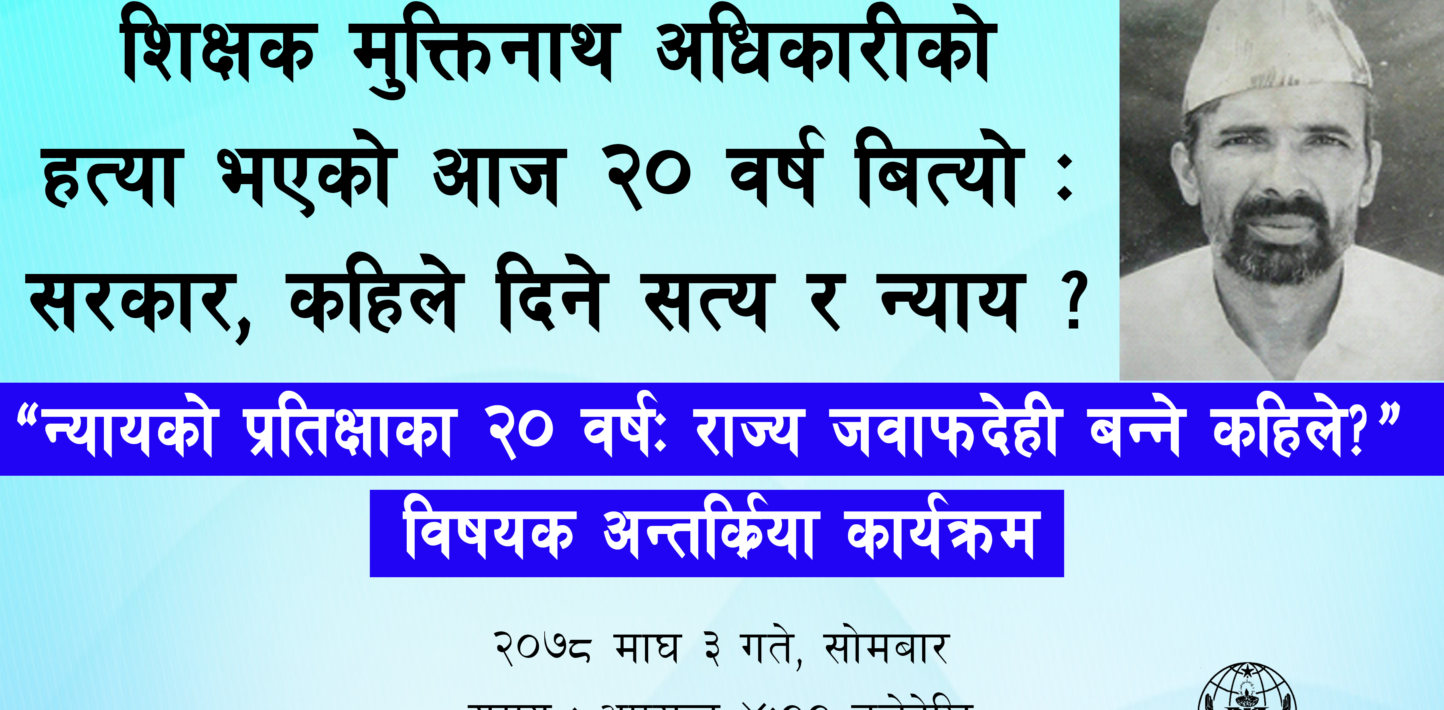For Immediate Release
Kathmandu: Families of late Muktinath Adhikari and rights activists are commemorating the 20th anniversary of his brutal killing with a perennially unaddressed question: when will the State be accountable for the human rights violations committed during the conflict?
Adhikari was brutally murdered by the then CPN (Maoist) cadres in Lamjung on 16 January 2002 allegedly for refusing to pay donations. A group of Maoist cadres had barged into the classroom where he was teaching science, and then abducted him in blindfold in front of his wailing and terror-stricken beloved students who were all pleading for his safety. He was taken to a nearby hillock in the village, tied to a tree with his muffler and rope, and then shot in the head and chest. He was the former head teacher at Panini Sanskrit Secondary School in Duradanda and the coordinator of Amnesty International Nepal Teachers’ Group-79, Lamjung.
The Adhikari family had knocked all the available doors of justice in Nepal but to no avail. The complaints registered at both the regular justice mechanism – the police, and the transitional justice mechanism – the Truth and Reconciliation Commission (TRC), lie rotten without any credible action to the family’s satisfaction. The complaint registered in National Human Rights Commission (NHRC) was also not properly and thoroughly investigated identifying the responsible guilty persons in the murder.
“Notwithstanding the fourth extension of the term of the two transitional justice bodies, the TRC and the Commission on Investigation of Enforced Disappeared Persons (CIEDP), not a single case has been resolved, and it is extremely sad that these mechanisms are made a tool of political bargain at the expense of the victims’ right to truth, justice and reparations,” Dipak Adhikari, treasurer of the Muktinath Adhikari Memorial Foundation, said. “We’ll continue speaking out against this injustice not only for the family of Muktinath Adhikari but to all those who continue to suffer protracted injustice at the hands of the state.”
We’ll continue speaking out against this injustice not only for the family of Muktinath Adhikari but to all those who continue to suffer protracted injustice at the hands of the state.
Dipak Adhikari, Treasurer, Muktinath Adhikari Memorial Foundation
At a time when it was difficult to freely express oneself, Muktinath Adhikari was committed to providing human rights education to his students and campaigning for human rights and justice.
“Adhikari was a valuable member of the Amnesty movement in Nepal, and we see his killing as an attack on the work of all human rights defenders,” Nirajan Thapaliya, director of Amnesty Nepal, said. “As we mourn the brutal killing of one of our valued members, our resolve for standing up and speaking out against any form of violence and injustice gets even more resolute.”
Adhikari was a valuable member of the Amnesty movement in Nepal, and we see his killing as an attack on the work of all human rights defenders. As we mourn the brutal killing of one of our valued members, our resolve for standing up and speaking out against any form of violence and injustice gets even more resolute.
Nirajan Thapaliya, Director, Amnesty International Nepal
The brutal murder of Muktinath Adhikari is one of the emblematic cases among thousands of human rights violations meted out to the civilians by both the state and the insurgent group during Nepal’s ten-year armed conflict period. The country is yet to see any official revelation of truth and justice on these violations despite the lapse of fifteen years since the signing of the Comprehensive Peace Accord in November 2006.
The victims of the conflict and human rights organisations have long been fighting consistently for truth, justice and reparations in Nepal. Unfortunately, however, the longstanding concerns of the victims and the rights groups to undertake a transparent, participatory and meaningful process for the amendment of the transitional justice law and adopt credible procedure to formulate the commissions as ordered by the Supreme Court on 26 February 2015 continues to be ignored.
“Instead of delaying and diluting the process, the state must demonstrate the willpower and an action-oriented firm commitment to address the long-stalled transitional justice in Nepal,” Suman Adhikari, son of Muktinath Adhikari said. “Without properly resolving the pain and issues of conflict related human rights violations, the climate of impunity and injustice in Nepal will continue which will adversely impact the country’s long-term peace and development.”
Without properly resolving the pain and issues of conflict related human rights violations, the climate of impunity and injustice in Nepal will continue which will adversely impact the country’s long-term peace and development.
Suman Adhikari, Son of Muktinath Adhikari
A memorial and interaction programme being held in honour of Muktinath Adhikari
On the 20th anniversary of this heinous crime and in honour of late Muktinath Adhikari, two organisations – Muktinath Adhikari Memorial Foundation and Amnesty International Nepal – are organising a memorial programme on 17 January 2022 at 4 pm. The memorial programme will be held online and will be attended by the members of the Adhikari family, relatives, locals, contemporary friends, human rights activists, journalists, and civil society members. In the programme, tributes will be paid to late Adhikari in memory of his social service, human rights activism and for his selfless and generous heart. This will be followed by an interaction on the topic “Awaiting Justice for 20 years: When will the State be accountable?”
Contact
- Suman Adhikari, Muktinath Adhikari Memorial Foundation, Tel: +977 9841454624, Email: suman.adhikari76@gmail.com
- Nirajan Thapaliya, Director, Amnesty International Nepal, Tel: +977 9851014452, Email: nirajan@amnestynepal.org
Click download button below to download the statement.
Download
- PR-ENG-20th.Anniversary.Muktinath.Adhikari.16.01.2022-1
- PR-NEP-20th.Anniversary.Muktinath.Adhikari.16.01.2022


